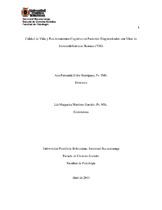| dc.contributor.advisor | Uribe Rodríguez, Ana Fernanda | |
| dc.contributor.author | Acevedo Pinto, María Katherine | |
| dc.contributor.author | Villanueva Acevedo, Oscar Felipe | |
| dc.coverage.spatial | Seccional Bucaramanga. Universidad Pontificia Bolivariana. Escuela de Ciencias Sociales. Facultad de Psicología | spa |
| dc.coverage.temporal | 2011 | |
| dc.date.accessioned | 2013-11-05T19:22:56Z | |
| dc.date.available | 2013-11-05T19:22:56Z | |
| dc.date.created | 2011-05-24 | |
| dc.date.issued | 2013-11-05 | |
| dc.identifier.uri | http://hdl.handle.net/20.500.11912/1152 | |
| dc.description | 98p.: (pdf); il; tablas; anexos | spa |
| dc.description.abstract | La presente investigación describió el nivel de calidad de vida de pacientes diagnosticados con Virus de Inmunodeficiencia Humana utilizando el MOS-HIV y el funcionamiento cognitivo en tres áreas: atención, memoria y lenguaje, a través del Trail Making Test, Escala de Memoria Weschler y el Test de Fluidez Verbal Semántica y Fonológica. Tuvo como población objeto a personas diagnosticadas con VIH de Bucaramanga y su área metropolitana que se encontraban en fase asintomática y sintomática inicial, teniendo como criterio la cantidad de Células CD4 y la carga viral en su cuerpo; además de tener en cuenta otros criterios de exclusión como lo fueron los antecedentes psiquiátricos, consumo de sustancias psicoactivas, dificultades auditivas, visuales o motrices y, finalmente, haberse encontrado en fase SIDA. Se tomó como muestra a 20 pacientes infectados con VIH, 10 asintomáticos y 10 en fase sintomática inicial, pertenecientes a una fundación y un hospital en la ciudad de Bucaramanga. El estudio fue de tipo exploratorio descriptivo, en el que se midió el nivel de calidad de vida y el funcionamiento cognitivo en los procesos de atención, memoria y lenguaje, con lo cual se elaboró una caracterización de los pacientes evaluados. En cuanto a los resultados encontrados, en la exploración del componente de calidad de vida, los pacientes sintomáticos arrojaron mayores puntuaciones que los pacientes asintomáticos sin representar, de igual forma, diferencias significativas entre los grupos; a nivel de funcionamiento cognitivo, se halló déficit significativo tanto en la fase sintomática como asintomática utilizando baremos de comparación; adicionalmente, al realizar un test-t para comparar el desempeño entre los pacientes de las dos fases, no se evidenciaron diferencias estadísticamente significativas. | spa |
| dc.description.abstract | The current Investigation described the quality of life level on patients with Human Immunodeficiency Virus diagnostic, by using the MOS-HIV test and also described the cognitive functions in three areas: attention, memory and language trough the Trail Making Test, The Wechsler Memory Scale and the Test of phonological and semantic verbal fluency. Had as the target population, the people of Bucaramanga and his metropolitan area with HIV diagnostic that were in asymptomatic and initial symptomatic phase, including others criteria like CD4 count and viral charge; among others exclusions criteria, like background psychiatric, consume of psychoactive substances, hearing, visual or motor difficulties and finally has ever been on AIDS phase. The sample was 20 infected patients with HIV, 10 asymptomatic and 10 on symptomatic initial phase, from a foundation and a Hospital in the city of Bucaramanga. The study was an exploratory descriptive type. It was measured the quality of life level and the cognitive functions of attention, memory and language, which from it was elaborated a characterization of the diagnosed and evaluated patients. On the topic related with cognitive function it was found significant deficit in both phases by using comparison scales, and the result of the test t, made to compare the performance of the patients on both phases, show no statistic significant differences and in the exploration of quality of life the symptomatic patients show highest scores than asymptomatic patients, without represent any big differences between the groups. | |
| dc.language.iso | es | |
| dc.publisher | Universidad Pontificia Bolivariana | spa |
| dc.rights | Attribution-NonCommercial-NoDerivatives 4.0 International | * |
| dc.rights.uri | http://creativecommons.org/licenses/by-nc-nd/4.0/ | * |
| dc.subject | Psicología | spa |
| dc.subject | Calidad de vida | spa |
| dc.subject | Células | spa |
| dc.subject | Lenguaje corporal | spa |
| dc.subject | Atención | spa |
| dc.subject | Memoria | spa |
| dc.subject | VIH | spa |
| dc.subject | Enfermos | spa |
| dc.subject | SIDA | spa |
| dc.title | Calidad de vida y funcionamiento cognitivo en pacientes diagnosticados con Virus de Inmunodeficiencia Humana (VIH) | spa |
| dc.type | bacherlorThesis | spa |
| dc.rights.accessRights | openAccess | spa |
| dc.type.hasVersion | publishedVersion | spa |
| dc.identifier.instname | instname:Universidad Pontificia Bolivariana | spa |
| dc.identifier.reponame | reponame:Repositorio Institucional de la Universidad Pontificia Bolivariana | spa |
| dc.identifier.repourl | repourl:https://repository.unab.edu.co/ | |


